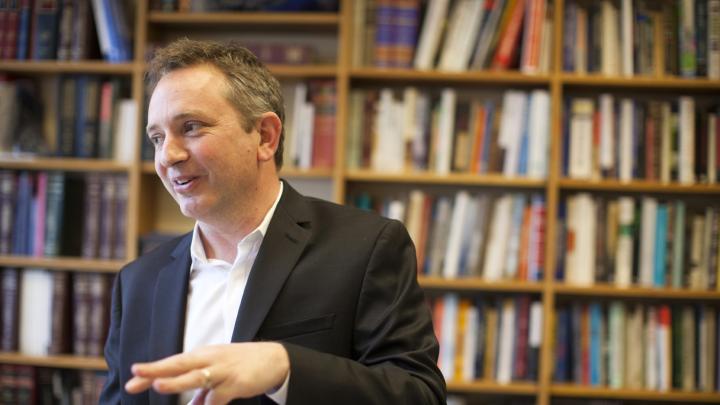During the disclosure on April 2 that e-mail accounts of a resident dean were investigated multiple times in connection with an Administrative Board review of students’ academic misconduct, President Drew Faust told the Faculty of Arts and Sciences (FAS) that the University appeared to have “highly inadequate” policies and processes in place for treating electronic communications properly.
In response, she retained attorney Michael B. Keating, LL.B. ’65, to review the facts of the situation and to report on whether the situation is fully understood; as The Harvard Crimson disclosed, his report will be delivered to a committee comprising Corporation members Lawrence S. Bacow, William F. Lee, and Theodore V. Wells Jr. According to a statement issued by Lee:
At the request of a Corporation committee, Mr. Keating’s review is focusing on the facts bearing on any searches of e-mail or e-mail metadata done in connection with the Administrative Board proceedings relating to a take-home exam in a spring 2012 undergraduate course.
In addition to discussing his findings with the Corporation committee, he will prepare a written report, with appropriate regard for confidentiality, that will be shared with the Harvard community. He aims to finish his work by June 30.
Separately, Faust said she would establish a University task force to establish policies and guidelines on e-mail privacy, chaired by Green professor of public law David J. Barron ’89, J.D. ’94. That group has now been assembled, and met for the first time on May 6. It is expected to make recommendations for Corporation action by the end of the coming fall term. It operates under this charter from Faust:
The task force will consider and recommend appropriate policies regarding access to, and confidentiality of, electronic communications that rely on university information systems. It will consult with faculty, staff, and students in order to obtain a full understanding of the perspectives of each group.
In undertaking its work, the task force will inform itself about policies now in place at Harvard and other relevant institutions and solicit perspectives and advice on best practices.
The task force will consider whether and to what extent Harvard’s policies should be University-wide or specific to certain parts of the University or particular institutional roles and responsibilities.
The task force will be expected to focus on recommending policies for the future that are both principled and practicable and that account for the reasonable expectations of individuals, the legitimate interests of the University, and associated issues of notice and process. The task force is not expected to investigate or render judgments on past events, but rather to take general account of instructive examples at Harvard and elsewhere as one means to understand the complex of considerations that can inform sound recommendations for the future.
The task force members, in addition to Barron, are:
- Patricia Byrne, executive dean, Harvard Divinity School
- Emma Dench, professor of the classics and of history, FAS
- Karen Emmons, associate dean for research and professor of social and behavioral sciences, Harvard School of Public Health (HSPH)
- Ann Forsyth, professor of urban planning, Harvard Graduate School of Design
- Jeffry Frieden, Stanfield professor of international peace, FAS
- Archon Fung, Ford Foundation professor of democracy and citizenship, Harvard Kennedy School
- John Goldberg, Goldston professor of law, Harvard Law School (HLS)
- Rakesh Khurana, Bower professor of leadership development, Harvard Business School, and Master of Cabot House
- Jennifer Leaning, director, François-Xavier Bagnoud Center for Health and Human Rights, and FXB professor of the practice of health and human rights, HSPH, and associate professor of medicine, Harvard Medical School (HMS)
- Nonie Lesaux, professor of education, Harvard Graduate School of Education
- Barbara McNeil, Watts professor of health care policy and professor of radiology, HMS
- Daniel Meltzer, Story professor of law, HLS
- Richard Mills, executive dean for administration, HMS
- John Gregory Morrisett, Cutting professor of computer science, School of Engineering and Applied Sciences
- Jonathan Lee Walton, Plummer professor of Christian morals and Pusey minister in the Memorial Church, FAS, and professor of religion and society, Harvard Divinity School
The task force will be staffed by Marilyn Hausammann, vice president for human resources; Robert Iuliano, vice president and general counsel; Anne Margulies, vice president and chief information officer; and Leah Rosovsky, vice president for strategy and programs.
The Gazette published an interview with Barron; he observed that
We are absolutely going to look at other schools and many other contexts in which this issue arises within institutions that seem relevant. I think we want to know about other schools, but we also want to know about other workplaces, not necessarily because they map on to ours, but seeing the differences in how they’ve constructed polices might give us insight into what’s different about our community.
Commenting on public versus private institutions, he said:
I’d say as a class, universities and particularly large-scale universities, complex universities like Harvard, are unusual institutions on a variety of dimensions because of their mission, but also because of their complexity and the variety of roles that they play, which aren’t even typical of a traditional employer, and so all of that has to be considered in making a recommendation about what kind of electronic communication privacy policy we should have.
He also observed that student e-mails are on the policymaking agenda:
The mandate of the committee is to the entire University, which obviously encompasses students. There are unique questions that are posed by student communications and we are going to consider how our broad recommendations would engage with that. An important task of the committee is going to be to consult with student representatives and those who are responsible for students to make sure we have a good understanding of that set of questions.








